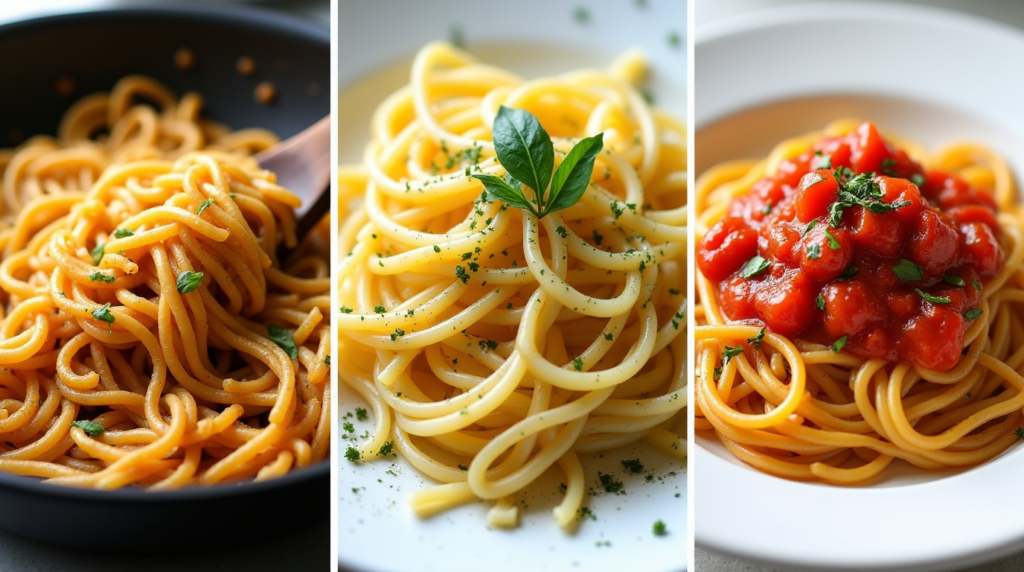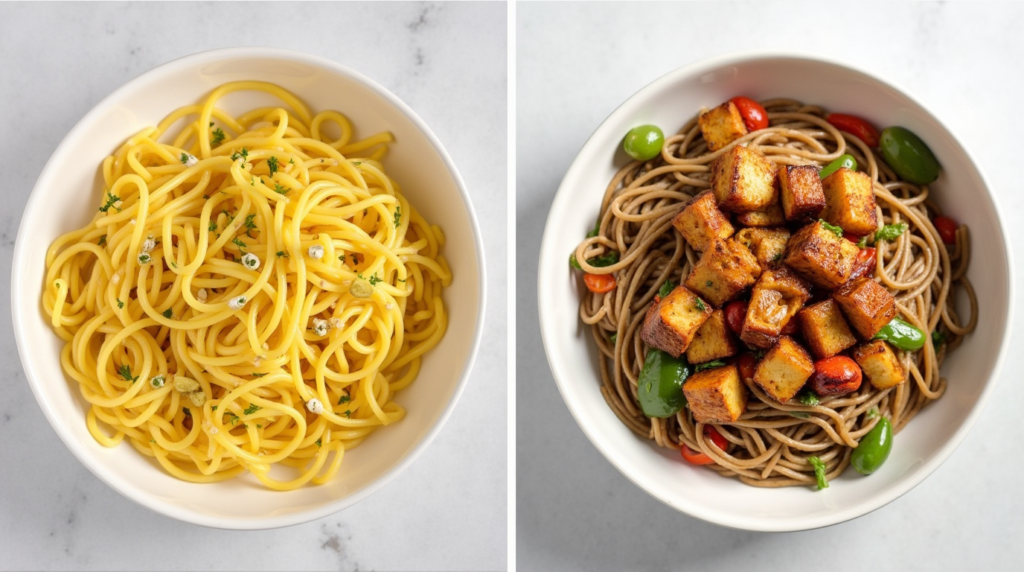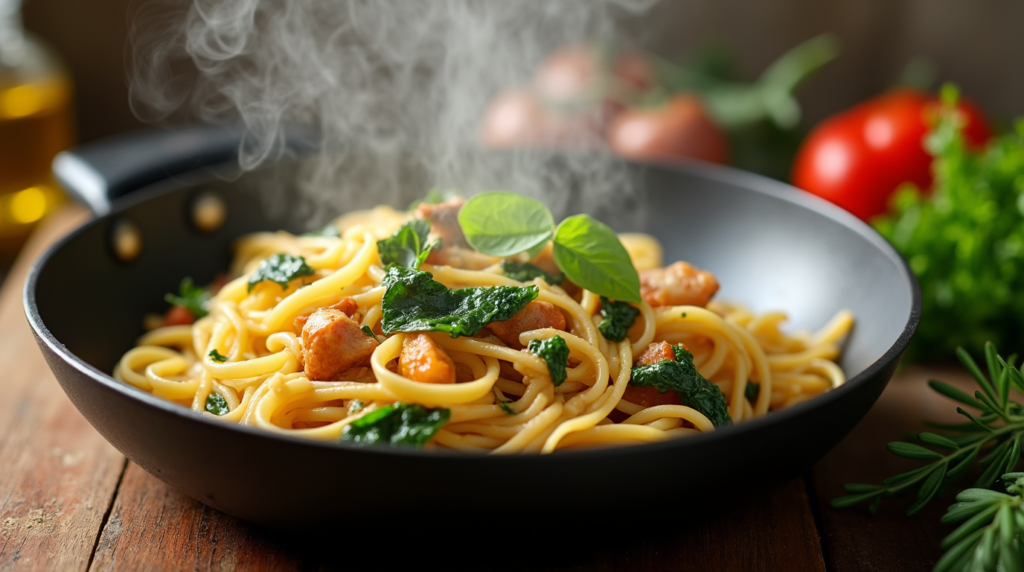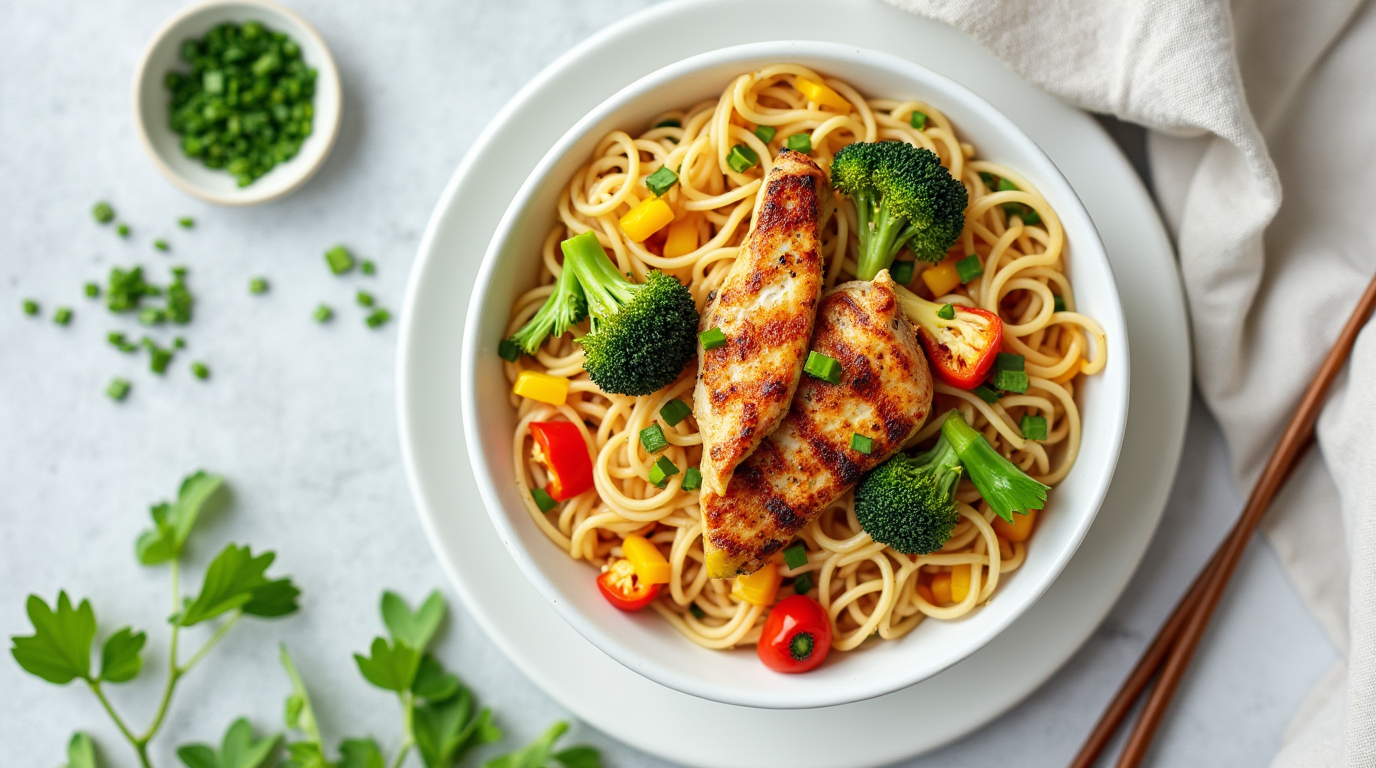Are Egg Noodles Healthy? Nutrition Facts & Smart Tips
You might be wondering if are egg noodles healthy addition to your diet. As a popular comfort food, they are often associated with rich, savory sauces and hearty portions. However, the nutritional value of egg noodles is more nuanced than you might think.
Egg noodles are made from a combination of flour, eggs, and water, which provides a good source of carbohydrates and protein. Understanding their nutritional profile can help you make informed decisions about incorporating them into your meals.
Key Takeaways
- Egg noodles can be a part of a balanced diet when consumed in moderation.
- The nutritional value of egg noodles includes a good mix of carbohydrates and protein.
- Pairing egg noodles with vegetables and lean proteins can enhance their nutritional profile.
- It’s essential to be mindful of portion sizes to avoid excessive calorie intake.
- Choosing whole-grain or fortified egg noodles can provide additional nutritional benefits.
What Are Egg Noodles? Understanding the Basics
You might be familiar with egg noodles, but do you know what they’re made of and how they’re produced? Egg noodles are a type of pasta made primarily from eggs and flour, distinguishing them from regular pasta, which is typically made from semolina flour and water.
Definition and Origin of Egg Noodles
Egg noodles have a rich history that dates back to ancient China, where they were first made. The inclusion of eggs gives them a richer flavor and a more yellow color compared to traditional pasta. Over time, egg noodles have spread to various parts of the world, adapting to local tastes and ingredients.
How Egg Noodles Are Made
The process of making egg noodles involves mixing eggs with flour to form a dough, which is then kneaded and rolled out into thin sheets. These sheets are cut into various shapes and sizes, depending on the desired type of noodle. The noodles are then cooked in boiling water until they are al dente.

Different Types of Egg Noodles Around the World
There are numerous types of egg noodles enjoyed globally, each with its unique characteristics. Some popular varieties include:
- Chinese Egg Noodles: Often used in stir-fries and soups.
- German Egg Noodles: Known as “Spätzle,” these are a staple in German cuisine.
- Italian Egg Noodles: “Tagliatelle” and “Fettuccine” are popular types used in Italian cooking.
Understanding these basics can help you appreciate the diversity and richness egg noodles bring to various cuisines.

Nutritional Profile of Egg Noodles
Understanding the nutritional profile of egg noodles is crucial for making informed dietary choices. Egg noodles are a popular ingredient in many dishes, and their nutritional content can significantly impact your overall diet.
Calories and Macronutrients
Egg noodles are primarily composed of carbohydrates, with a moderate amount of protein and a relatively low fat content. According to the USDA, a serving of cooked egg noodles contains approximately 220 calories, 6g of protein, and 40g of carbohydrates.
Protein Content
The protein in egg noodles comes from the eggs and wheat flour used in their production. While not extremely high, the protein content contributes to the overall nutritional value.
Carbohydrate Breakdown
Carbohydrates are the main component of egg noodles. They provide energy but can impact blood sugar levels. Understanding the carbohydrate breakdown is essential for managing your diet.
Fat Profile
Egg noodles have a relatively low fat content. The fat present is partly from the eggs used in the dough, contributing to the overall calorie count.
Vitamins and Minerals in Egg Noodles
Egg noodles can be a source of various vitamins and minerals, depending on the ingredients used. Enriched egg noodles, for example, may contain added iron and B vitamins.
Comparing Cooked vs. Dry Egg Noodles
| Nutritional Component | Cooked Egg Noodles (per serving) | Dry Egg Noodles (per 100g) |
|---|---|---|
| Calories | 220 | 370 |
| Protein | 6g | 12g |
| Carbohydrates | 40g | 60g |
| Fat | 2g | 4g |
This comparison highlights the significant differences in nutritional content between cooked and dry egg noodles, emphasizing the importance of considering the cooking state when evaluating nutritional value.
Are Egg Noodles Healthy? The Complete Analysis
When it comes to assessing the healthiness of egg noodles, it’s essential to consider both their nutritional benefits and drawbacks. Egg noodles can be a part of a healthy diet when consumed thoughtfully.
Health Benefits of Egg Noodles
Egg noodles offer several health benefits due to their nutritional content. They are a good source of energy, particularly for athletes and active individuals, because of their carbohydrate content. Additionally, egg noodles contain protein, which is vital for muscle repair and growth.
Potential Nutritional Drawbacks
Despite their benefits, egg noodles also have some nutritional drawbacks. They can be high in calories and carbohydrates, which may be a concern for those managing their weight. Furthermore, some egg noodle products may contain high amounts of sodium or saturated fats, depending on the ingredients used.
Who Should Include or Limit Egg Noodles
The suitability of egg noodles in one’s diet can vary based on individual needs and health goals.
Athletes and Active Individuals
Athletes and active individuals can benefit from egg noodles as a source of carbohydrates for energy. However, it’s crucial to balance them with protein-rich foods and vegetables for a well-rounded meal.
Weight Management Considerations
For those managing their weight, it’s essential to be mindful of portion sizes and overall calorie intake when consuming egg noodles. Choosing whole-grain or vegetable-based egg noodles can be a healthier option.
Children and Elderly Nutrition
Egg noodles can be a nutritious option for children and the elderly when served with nutrient-dense sauces or mixed with vegetables and lean proteins. For elderly individuals with dental issues, softer egg noodle dishes can be easier to consume.
In conclusion, egg noodles can be part of a healthy diet when consumed in moderation and prepared with nutritional balance in mind. By understanding their benefits and drawbacks, you can make informed choices about including egg noodles in your meals.
Egg Noodles vs. Regular Pasta: Key Differences
When it comes to choosing between egg noodles and regular pasta, understanding their differences is crucial for making informed dietary decisions.
Nutritional Comparison Chart
Egg noodles generally have a higher protein content compared to regular pasta due to the presence of eggs. Here’s a comparison chart:
| Nutritional Element | Egg Noodles | Regular Pasta |
|---|---|---|
| Protein Content | Higher | Lower |
| Calories | Similar | Similar |
| Fat Content | Moderate | Low |
Texture and Cooking Properties
Egg noodles have a richer texture and are more tender than regular pasta. They cook relatively quickly and retain their texture well.
Best Culinary Uses for Each Type
- Egg noodles are ideal for creamy sauces and casseroles.
- Regular pasta is versatile and works well with a variety of sauces, from tomato-based to olive oil-based.
Understanding these differences can help you choose the right type of noodle for your next meal, ensuring a more enjoyable and satisfying dining experience.
Egg Noodles vs. Whole Wheat Noodles: Making the Healthier Choice
When deciding between egg noodles and whole wheat noodles, understanding their nutritional differences is key to making a healthier choice. Both types of noodles have their unique characteristics, advantages, and disadvantages.

Nutritional Differences
Egg noodles are made from wheat flour and eggs, giving them a distinct nutritional profile compared to whole wheat noodles, which are made from whole wheat flour. Whole wheat noodles generally have more fiber and nutrients due to the use of whole grains.
A comparison of the nutritional values reveals that whole wheat noodles have a higher fiber content, which can aid in digestion and satiety. Egg noodles, on the other hand, may have a higher protein content due to the presence of eggs.
| Nutritional Aspect | Egg Noodles | Whole Wheat Noodles |
|---|---|---|
| Fiber Content | Low | High |
| Protein Content | Moderate | Moderate |
| Calorie Count | Similar | Similar |
Fiber Content Comparison
Whole wheat noodles have a significantly higher fiber content compared to egg noodles. This higher fiber content can contribute to better digestive health and a feeling of fullness, which can be beneficial for weight management.
Taste and Texture Considerations
Egg noodles are known for their rich, egg-forward flavor and smooth texture. Whole wheat noodles, while sometimes denser and heavier, offer a nuttier flavor that many find appealing. The choice between the two may come down to personal preference regarding taste and texture.
“The choice between egg noodles and whole wheat noodles ultimately depends on your dietary needs and preferences.”
— Nutrition Expert
When to Choose Each Type
Choose egg noodles when you’re looking for a protein-rich option or prefer their taste and texture. Opt for whole wheat noodles when you need a higher fiber intake or are looking for a more nutrient-dense meal option.
In conclusion, both egg noodles and whole wheat noodles can be part of a healthy diet. Understanding their nutritional differences and choosing based on your needs can help you make the healthier choice.
Protein Content in Egg Noodles: What You Need to Know
The protein content in egg noodles is a significant aspect of their nutritional profile. Egg noodles contain approximately 6g of protein per serving, making them a decent source of protein in your diet.
Amount of Protein
Egg noodles provide a moderate amount of protein, which is essential for muscle repair, growth, and overall health. The exact protein content can vary based on the brand and type of egg noodles you choose.
Quality of Protein
The quality of protein in egg noodles is relatively good due to the presence of eggs, which are a complete protein source. However, when consumed alone, egg noodles may not provide all the essential amino acids your body needs.
Enhancing Protein Content
To boost the protein content of your egg noodle dishes, consider adding protein-rich ingredients.
Protein-Boosting Ingredients
- Grilled chicken
- Turkey breast
- Tofu
- Legumes like lentils or chickpeas
Balanced Meal Ideas
Creating balanced meals with egg noodles can be achieved by combining them with vegetables and lean proteins. For example, a stir-fry with egg noodles, mixed vegetables, and grilled chicken makes for a nutritious meal.
| Meal Component | Protein Content (g) |
|---|---|
| Egg Noodles (1 serving) | 6 |
| Grilled Chicken (3 oz) | 26 |
| Tofu (3 oz) | 9 |
| Legumes (1 cup cooked) | 15 |
Carbohydrates in Egg Noodles: Friend or Foe?
Carbohydrates in egg noodles can be a friend or foe, depending on how they fit into your overall diet. Egg noodles are a significant source of carbohydrates, which are essential for energy production in the body.
Understanding the Carb Content
Egg noodles typically contain a considerable amount of carbohydrates. A serving of cooked egg noodles can range from 30 to 40 grams of carbs, depending on the brand and cooking method. Understanding this carb content is crucial for managing your daily carbohydrate intake.
Glycemic Index of Egg Noodles
The glycemic index (GI) is a measure of how quickly foods raise blood sugar levels. Egg noodles have a moderate GI, meaning they can provide a relatively balanced source of carbohydrates without causing a sharp spike in blood sugar. As noted by a registered dietitian, “Egg noodles can be a good carbohydrate choice for those looking for a moderate GI food.”
“The key to benefiting from egg noodles is balancing them with other nutrient-dense foods.”
Balancing Carbs in Your Daily Diet
To balance the carbs from egg noodles, pair them with vegetables, lean proteins, and healthy fats. This balance is crucial for maintaining a healthy diet and managing carbohydrate intake effectively.
Pre and Post-Workout Egg Noodle Meals
Egg noodles can be a valuable part of pre or post-workout meals due to their carbohydrate content. Consuming egg noodles before a workout can provide sustained energy, while having them post-workout can help in replenishing glycogen stores.
In conclusion, the carbohydrates in egg noodles can be a valuable part of a balanced diet when consumed thoughtfully. By understanding their carb content and balancing them with other foods, you can enjoy egg noodles as a nutritious and satisfying meal option.
Fat Content and Cholesterol Considerations
When it comes to egg noodles, understanding their fat content is crucial for making informed dietary choices. Egg noodles contain a small amount of fat, primarily due to the eggs used in their production. This inherent fat content can impact your overall dietary intake, particularly if you’re monitoring your fat consumption.
Types of Fat in Egg Noodles
Egg noodles typically contain a mix of saturated and unsaturated fats. The eggs used in their production contribute to the fat content, with a large egg containing about 5 grams of fat. Understanding the types of fat present can help you make healthier choices.
Cholesterol Content and Heart Health
The cholesterol in egg noodles is another consideration for heart health. With about 180-200 milligrams of cholesterol per 100 grams of noodles, egg noodles can be part of a balanced diet when consumed in moderation. As the American Heart Association suggests,
“dietary cholesterol can affect some people’s heart health, but it’s not the only factor.”
Low-Fat Cooking Methods for Egg Noodles
You can reduce the fat content of your egg noodle dishes by using low-fat cooking methods. Boiling or steaming egg noodles are healthier options compared to frying. Adding vegetables and lean proteins can also enhance the nutritional value of your meal.
Heart-Healthy Egg Noodle Meal Ideas
To make heart-healthy egg noodle meals, consider combining them with vegetables like spinach and bell peppers, and lean proteins such as chicken or tofu. Using herbs and spices for flavor instead of salt and sugar can further enhance the health benefits of your meal.
Egg Noodles for Special Dietary Needs
If you’re considering egg noodles as part of your diet, it’s essential to understand how they fit into various dietary needs and restrictions. Egg noodles can be a nutritious and versatile option, but their suitability varies depending on individual dietary requirements.
Gluten Sensitivity and Celiac Disease
Individuals with gluten sensitivity or celiac disease may need to avoid traditional egg noodles made with wheat flour. However, many brands now offer gluten-free egg noodle alternatives made from rice, quinoa, or corn flour. When shopping for gluten-free egg noodles, ensure that the packaging is labeled as “gluten-free” to minimize cross-contamination risks.
Egg Allergies and Alternatives
For those with egg allergies, traditional egg noodles are not an option. Fortunately, there are egg-free noodle alternatives available, often made with vegetable-based ingredients or alternative protein sources. Some brands also offer egg-free egg noodles that mimic the taste and texture of traditional egg noodles.
Low-Carb and Keto Considerations
Egg noodles can be part of a low-carb or keto diet if consumed in moderation. To make egg noodles more keto-friendly, consider pairing them with high-fat sauces or adding protein-rich ingredients. Some brands also offer low-carb egg noodle options made from almond flour or other low-carb ingredients.
Vegetarian and Vegan Substitutes
While traditional egg noodles contain eggs, many vegetarian and vegan alternatives are available. These are often made with plant-based ingredients like mung bean, quinoa, or rice. When choosing vegetarian or vegan egg noodle substitutes, check the ingredient list to ensure they meet your dietary requirements.
In conclusion, egg noodles can be adapted to suit various dietary needs with the right choices and modifications. By understanding the ingredients and nutritional content, you can enjoy egg noodles as part of a balanced diet.
Portion Control: How Much Is Too Much?
When it comes to egg noodles, knowing how much is too much can be a game-changer for your health goals. Portion control is essential to enjoying egg noodles as part of a balanced diet.
Recommended Serving Sizes of Egg Noodles
A standard serving size of cooked egg noodles is approximately 1 cup. This serving size contains a balanced mix of carbohydrates, protein, and calories. Being mindful of this serving size helps you manage your calorie intake effectively.
Visual Guides for Portion Control
To make portion control easier, use visual guides. For example, a serving of cooked egg noodles is roughly the size of a tennis ball or fits in the palm of your hand. These visual cues can help you gauge your portion sizes accurately.
Balancing Your Plate with Egg Noodles
Balancing your meal is crucial. Pair your egg noodles with vegetables and lean proteins to create a well-rounded meal. This not only enhances the nutritional value but also helps in maintaining portion control.
Meal Prep Tips for Controlled Portions
Meal prep is an effective way to control portions. Cook your egg noodles in bulk, portion them out into individual servings, and store them in containers. This way, you’re less likely to overeat and can manage your egg noodles calories more effectively.
Healthiest Ways to Prepare Egg Noodles
To maximize the nutritional benefits of egg noodles, it’s crucial to prepare them in a healthy manner. The right cooking methods and ingredients can make a significant difference in the final nutritional value of your meal.

Cooking Methods That Preserve Nutrients
Steaming or lightly boiling egg noodles is an effective way to preserve their nutrients. Overcooking can lead to a loss of vitamins and minerals, so it’s best to cook them until they’re al dente. Avoid overcooking to retain the noodles’ natural texture and nutritional content.
Healthy Sauce Options
Sauces can greatly enhance the flavor of egg noodles, but they can also add extra calories, salt, and sugar. Opt for low-sodium alternatives or make your own sauces using fresh ingredients.
Low-Sodium Alternatives
Using herbs and spices can add flavor without adding salt. Consider making a sauce with garlic, olive oil, and lemon juice for a healthy and tasty option.
Vegetable-Based Sauces
Blending cooked vegetables into a sauce is another healthy option. Tomato sauce made with fresh tomatoes, onions, and garlic is not only delicious but also packed with nutrients.
Adding Vegetables and Lean Proteins
Incorporating a variety of vegetables and lean proteins into your egg noodle dishes can significantly enhance their nutritional value. Vegetables like broccoli, bell peppers, and carrots are rich in vitamins and antioxidants, while lean proteins such as chicken, turkey, or tofu can add protein without excessive fat.
Herbs and Spices for Flavor Without Extra Calories
Using herbs and spices is a great way to add flavor to your egg noodles without adding extra calories. Fresh basil, oregano, and thyme can add a lot of flavor, while spices like paprika and cumin can add depth without salt or sugar.
Best Egg Noodle Brands for Health-Conscious Consumers
Navigating the world of egg noodles can be challenging, but knowing the best brands for health-conscious consumers can make all the difference. With numerous options available, it’s essential to identify brands that prioritize nutritional value.
Top Whole Grain Egg Noodle Options
Some brands offer whole grain egg noodles that are higher in fiber and nutrients compared to their refined counterparts. Bionaturae and Annie’s Homegrown are notable brands that provide organic whole grain egg noodles. These options not only offer a more nutritious profile but also cater to consumers looking for less processed food.
Organic and All-Natural Brands
For those seeking organic or all-natural egg noodle options, brands like Barilla and Muir Glen offer products made with high-quality, non-GMO ingredients. These brands are committed to sustainable practices and provide consumers with healthier alternatives.
Reading Labels: What to Look For
When selecting an egg noodle brand, it’s crucial to read labels carefully. Look for products with fewer ingredients and avoid those with artificial preservatives or additives.
Ingredients to Avoid
- Artificial colors and flavors
- Preservatives like sodium benzoate
- Excessive sodium
Nutritional Benchmarks
When evaluating egg noodle brands, consider the nutritional content. Opt for brands that offer:
| Nutritional Aspect | Ideal Value |
|---|---|
| Fiber Content | At least 3g per serving |
| Protein Content | At least 6g per serving |
| Sodium Content | Less than 200mg per serving |
Budget-Friendly Healthy Options
Healthy egg noodle options don’t have to break the bank. Brands like Kraft offer whole grain egg noodles at an affordable price point, making healthier choices more accessible to a wider audience.
“The key to a healthy diet is making informed choices. By choosing whole grain and organic egg noodle options, consumers can enjoy a more balanced meal.”
— Nutrition Expert
Healthy Egg Noodle Recipes for Every Meal
You can enjoy egg noodles in numerous healthy recipes, from breakfast to dinner. Egg noodles are a versatile ingredient that can be incorporated into a variety of dishes, making mealtime exciting and nutritious.
Nutritious Breakfast Ideas with Egg Noodles
Start your day with a nutritious breakfast featuring egg noodles. Try combining cooked egg noodles with scrambled eggs, spinach, and cherry tomatoes for a protein-packed meal. Alternatively, mix egg noodles with Greek yogurt, honey, and fresh berries for a sweet and satisfying breakfast.
Balanced Lunch and Dinner Recipes
For lunch or dinner, egg noodles can be the base for a balanced meal. Create a stir-fry with egg noodles, lean chicken, and a variety of colorful vegetables like bell peppers and broccoli. You can also make a hearty soup by simmering egg noodles with vegetables and lean beef in a broth.
Lighter Side Dishes and Salads
Egg noodles can also be used in lighter side dishes and salads. Toss cooked egg noodles with olive oil, lemon juice, and chopped herbs like parsley or basil for a refreshing side. For a salad, combine egg noodles with mixed greens, cherry tomatoes, cucumber, and a light vinaigrette.
Meal Prep Recipes for Busy Weekdays
Meal prep is made easy with egg noodles. Cook a large batch of egg noodles and use them throughout the week in different meals. For example, you can make a noodle bowl with egg noodles, roasted vegetables, and lean protein one day, and a noodle salad with egg noodles, mixed greens, and a light dressing the next.
By incorporating egg noodles into your meal routine, you can enjoy a variety of healthy and delicious dishes. Whether you’re looking for a quick breakfast, a satisfying lunch, or a comforting dinner, egg noodles are a great choice.
Common Myths About Egg Noodles Debunked
Many people have misconceptions about egg noodles; it’s time to debunk these myths. Egg noodles are often misunderstood due to generalizations about pasta or misinformation about their nutritional content.
Myth: “All Pasta Is Unhealthy”
Not all pasta is created equal. While some types may be high on the glycemic index or low in nutrients, egg noodles can be a healthier option when made with wholesome ingredients and cooked al dente.
Myth: “Egg Noodles Are Just Empty Calories”
Egg noodles can provide a good source of carbohydrates, protein, and some B vitamins. When paired with nutrient-rich sauces or ingredients, they can be part of a balanced meal.
Myth: “Homemade Is Always Healthier”
While homemade egg noodles can be a healthier option because you control the ingredients, store-bought versions can also be nutritious if you choose brands that use wholesome ingredients and minimal processing.
Myth: “Egg Noodles Cause Weight Gain”
Egg noodles themselves are not the direct cause of weight gain. It’s the portion size and what you pair them with that matters. A balanced dish with egg noodles, vegetables, and lean protein can be part of a weight management diet.
| Myth | Reality |
|---|---|
| All pasta is unhealthy | Egg noodles can be a healthy choice when made and cooked properly |
| Egg noodles are just empty calories | They provide carbs, protein, and some B vitamins |
| Homemade is always healthier | Store-bought can be nutritious if you choose the right brand |
| Egg noodles cause weight gain | Portion size and accompanying ingredients are the real factors |
Conclusion: Enjoying Egg Noodles as Part of a Balanced Diet
Egg noodles can be a nutritious and enjoyable part of your balanced diet. By understanding their nutritional profile and preparing them healthily, you can make informed choices that support your overall well-being. When considering whether are egg noodles healthy, it’s clear that they offer several benefits when consumed mindfully.
To make the most of egg noodles, focus on portion control, pair them with nutrient-dense ingredients, and explore various cooking methods that preserve their nutritional value. This approach will help you maintain a balanced diet while enjoying your favorite egg noodle dishes.
By incorporating egg noodles into a balanced diet, you can enjoy a variety of delicious and healthy meals. So, go ahead and savor your favorite egg noodle dishes, knowing you’re making a healthy choice that supports your overall health and well-being.
FAQ
Are egg noodles a healthy option for my diet?
Egg noodles can be a healthy option when consumed in moderation and prepared with nutritious ingredients. They provide a good source of energy, protein, and some essential vitamins and minerals.
What is the nutritional value of egg noodles?
According to the USDA, a serving of cooked egg noodles contains approximately 220 calories, 6g of protein, and 40g of carbohydrates. They also contain some essential vitamins and minerals like iron and B vitamins.
How do egg noodles compare to whole wheat noodles in terms of nutrition?
Whole wheat noodles generally have a higher fiber content compared to egg noodles. However, egg noodles have a higher protein content due to the presence of eggs. The choice between the two ultimately depends on your individual nutritional needs.
Can I include egg noodles in my weight management diet?
Yes, you can include egg noodles in your weight management diet if you consume them in moderation and balance them with other nutrient-dense foods. Be mindful of portion sizes and cooking methods to keep calorie counts in check.
Are there any specific egg noodle brands that are considered healthier than others?
Some brands offer whole grain or organic egg noodle options that are higher in fiber and nutrients. Look for brands that use wholesome ingredients and have minimal added preservatives or sodium.
How can I make my egg noodle dishes healthier?
You can make your egg noodle dishes healthier by adding vegetables, lean proteins, and using herbs and spices for flavor instead of relying on high-sodium sauces. Steaming or lightly boiling egg noodles can also help preserve their nutrients.
Can individuals with gluten sensitivity or celiac disease consume egg noodles?
Traditional egg noodles are made with wheat flour, which contains gluten. Individuals with gluten sensitivity or celiac disease may need to avoid traditional egg noodles or look for gluten-free alternatives made from ingredients like rice or quinoa.
What are some healthy ways to prepare egg noodles?
Healthy ways to prepare egg noodles include steaming or lightly boiling them, using low-sodium sauces, and adding plenty of vegetables and lean proteins. You can also experiment with different herbs and spices to add flavor without extra calories.
Leave a Review & Rate This Recipe!
There are no reviews yet. Be the first one to write one.

